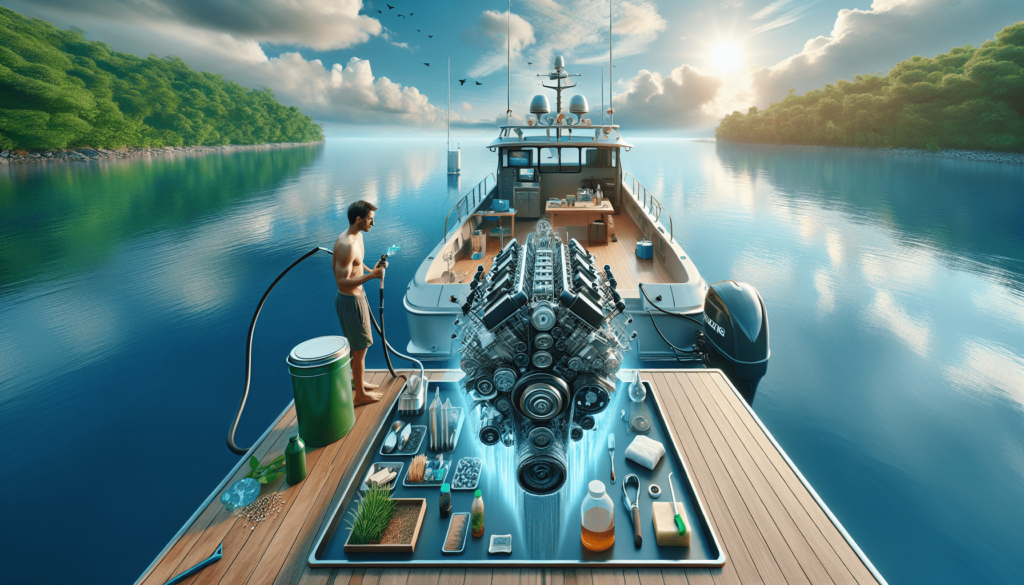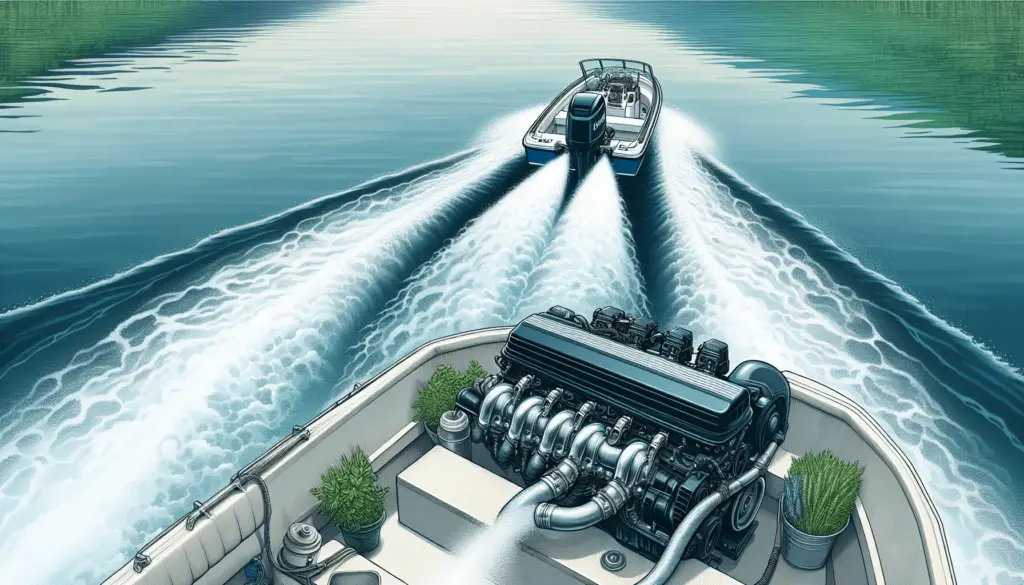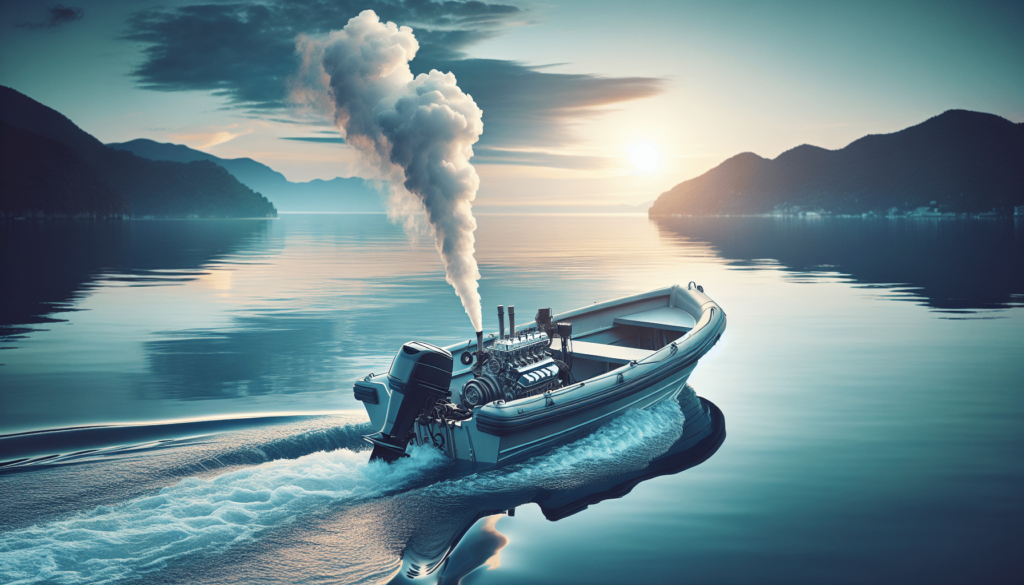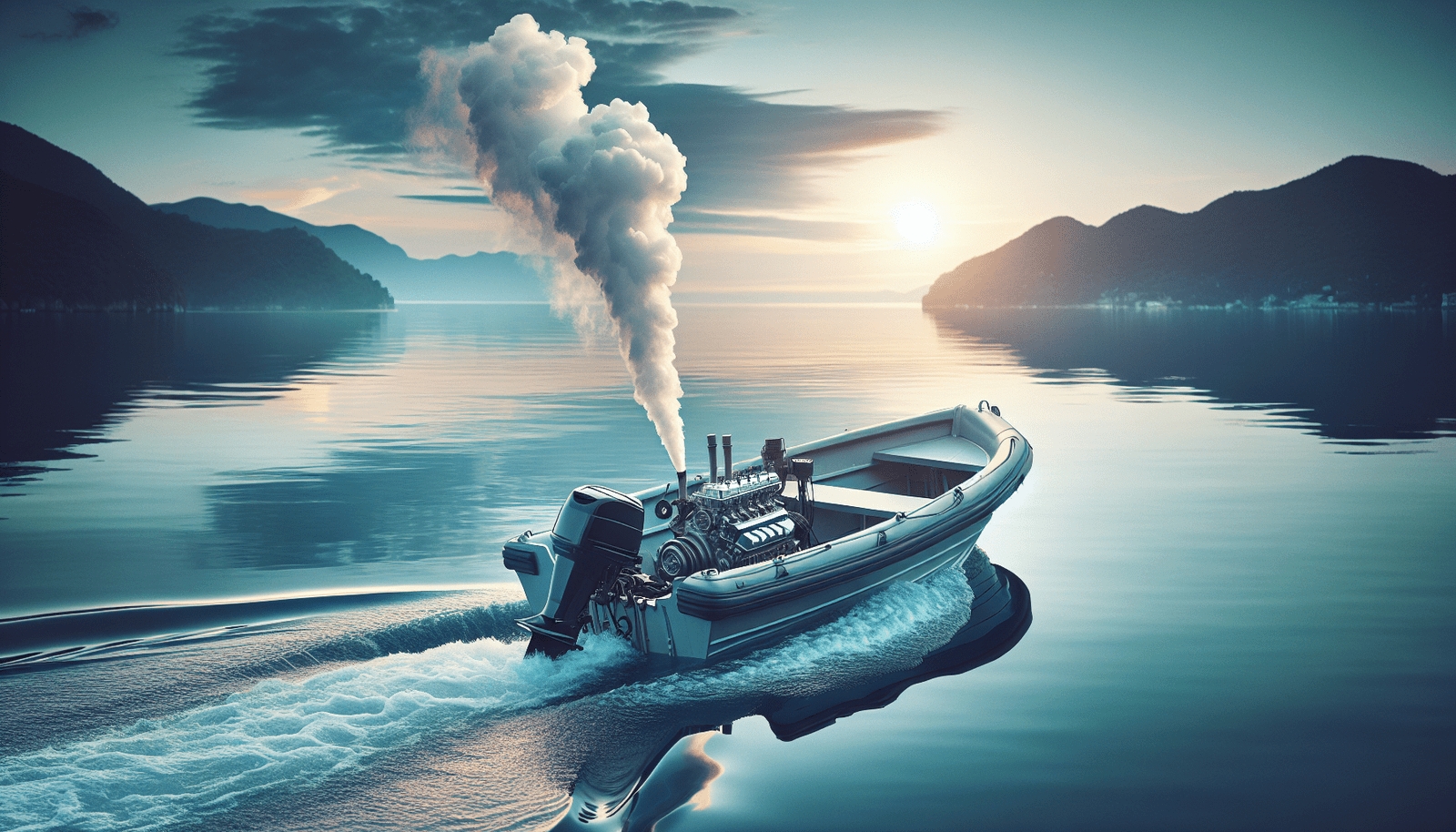You’re a boat enthusiast, sailing freely across the vast blue expanse, soaking in nature’s beauty, and reveling in the captivating serenity. But, have you given a thought to the potential pollution your boat’s engine might be causing to the very waters you adore? The article titled “Best Practices for minimizing water pollution from boat engines” furnishes an in-depth look into how you can go from being a part of the problem, to being a part of the solution, by adopting sustainable boating practices. This insightful piece will not only equip you with the knowledge needed to properly maintain your boat’s engine for environmental benefit but also urge you to always consider your every action’s impact on the world we live in.

Understanding the Impact of Boat Engines on Water Pollution
In your adventures on the blue sea or calm lake, the last thing you might think about is the impact your boat engine has on those very waters you’re enjoying. However, it’s a fact that boat engines contribute to water pollution significantly. Understanding this impact is crucial in combatting the problem and preserving marine ecosystems for future generations.
Defining water pollution from boat engines
Water pollution from boat engines refers to the contamination of marine environments by harmful substances or particles discharged as a result of engine operations. This could be anything from fuel, engine oil, coolant, or even smoke particles. Even though these pollutants may seem negligible at the individual level, remember, every drop in the ocean counts!
Highlighting the most common pollutants from boat engines
Among the pollutants emitted by boat engines, oil and gasoline are the most prevalent. Oil leaks often occur due to irregular engine maintenance or accidental spills during refuelling. Gasoline, the most commonly used fuel for boats, contains harmful hydrocarbons and other chemicals that can contaminate the water, leading to a series of detrimental effects on marine life.
Presenting statistical data on water pollution from boat engines
Think your boat engine doesn’t produce that much pollution? Let’s clear the fog. Studies show that a single two-stroke engine can dump up to 1/3 of its fuel into the water, untreated. Annually, recreational boating contributes to 15 percent of the hydrocarbons input into the waters. Such stats reveal the substantial impact boat engines have on water pollution.
Explaining the global effect of boat engine pollution
Boat engine pollution doesn’t just stop at water contamination; it has a ripple effect. Toxic pollutants, such as oil and gasoline, degrade the quality of water, disrupt the marine food chain, and diminish biodiversity. This effect can lead to unpredictable and potentially devastating implications on the global ecosystem.
Selecting Appropriate Boat Engines
Although boat engines do contribute to water pollution, it doesn’t mean you have to decommission your vessel. Making considerate choices when selecting your boat engine can make a world of difference.
The role of engine type in water pollution
Not all engines are created equal, especially when it comes to their environmental impact. Two-stroke engines, popular due to their power and simplicity, are known to be major culprits of marine pollution due to their design that leaves a lot of unburnt fuel in exhaust. On the other hand, newer four-stroke engines and direct fuel-injection two-strokes are much cleaner.
Guidelines on selecting low-emission boat engines
What does a responsible boater looking to reduce their impact on the environment do? First, consider engines certified to have low emissions. Four-stroke and direct fuel-injection engines as mentioned are excellent choices. You should also consider the size: picking an engine that perfectly matches your boat size can help avoid waste and make your boat more efficient.
Comparison of different types of boat engines in terms of pollution
To get into specifics, let’s compare some engine types. Two-stroke carbureted engines produce the most pollution, followed closely by traditional four-stroke engines. While fuel-injected two-stroke engines and contemporary four-stroke versions with improved technologies rank lower on the pollution scale. Electric engines are on the top tier as the most eco-friendly option, producing zero direct pollution.
Exploring the innovation of electric boat engines
Electric engines? That’s right! Despite their reputation as being only for tiny vessels or specific uses, e-engines have come a long way. They present a great promise in reducing waterfront pollution. Major manufacturers have started to delve into development and production of these types of engines, indicating the rising trend of environmentally conscious boating options.

Proper Maintenance of Boat Engines
A well-maintained engine is more than just peace of mind on open water; it also plays a part in reducing water pollution.
Significance of regular engine check-ups
Regular engine check-ups can prevent the build-up of harmful deposits that may end up discharged into the water. These check-ups also keep your engine operating at peak performance, which translates to less fuel consumption and, consequently, less pollution.
Tips on engine maintenance to reduce pollution
Where do you start in making sure your engine is as green as can be? Simple tasks such as fixing leaks promptly, installing oil absorbent pads in the bilge, proper disposal of engine fluids and ensuring tight-fitting connections can reduce the amount of pollutants your engine puts into the water. Remember, preventative measures can make a huge difference.
Common maintenance mistakes that increase water pollution
Certain maintenance practices can inadvertently contribute to pollution. An example is conducting maintenance tasks while the boat is in water, leading to accidental spills. Overfilling fuel tanks and not attending to visible leakage promptly are also common missteps. Awareness of these mistakes is crucial, letting you avoid them.
Recommended maintenance schedule for boat engines
How often should you conduct engine check-ups? A good rule of thumb is every 100 hours of operation or annually, whichever comes first. However, always refer to your engine’s owner manual as manufacturers may suggest different schedules based on the model and specifications.
Using Environment-Friendly Fuels and Oils
Rethinking what you put into your boat engine can be a game changer in reducing water pollution.
Benefits of using biofuels and synthetic oils
Biofuels and synthetic oils work in common engines just like their conventional counterparts, but with the added benefit of being more environmentally friendly. Biofuels emit fewer harmful chemicals while synthetic oils generally degrade faster in the environment, reducing their impact on marine life.
Dangers of conventional fuels and oils to marine life
Conventional fuels and oils, containing multiple harmful chemicals, pose a significant threat to marine life. Chemicals within these fuels and oils, when released into the water, can damage the outer layer of fish, impede photosynthesis in marine plants and even cause mass mortality events under certain circumstances.
Comparison of different eco-friendly fuels and oils
So, which green fuels and oils should you consider? Biodiesel and ethanol blends are popular biofuels with the common gasoline engine, while natural gas like propane can be a cleaner choice for some, though less common, engine types. For oils, biodegradable or synthetic oils are becoming increasingly available and could significantly reduce the impact on the environment if spilled.
How to switch from conventional to eco-friendly fuels and oils
Always up for a green switch? The first step is to confirm whether your engine can handle these alternatives. Check with the manufacturer’s guidelines or a local mechanic to avoid potential damage. When done carefully, the switch to eco-friendly fuels and oils can be a significant stride in cutting down your boat’s water pollution.

Adopting Responsible Boating Habits
The way you operate your boat can have a surprising impact on the environment. adopting responsible habits is a crucial part of minimizing water pollution.
Understanding the impact of boating speed on water pollution
Did you know that speeding isn’t only risky but also polluting? High speeds result in greater fuel consumption and therefore more emissions. Plus, larger waves created at higher speeds can stir up bottom sediment in shallow areas, promoting the spread of contaminants.
Avoiding marine areas susceptible to damage
Navigating your boat responsibly also involves avoiding areas that are susceptible to potential harm from boat activities. Delicate ecosystems like coral reefs, seagrasses, and mangroves are particularly vulnerable. Actions like anchoring responsibly or sticking to designated routes go a long way in preserving these habitats.
Optimum speed and driving methods to minimize pollution
So, what’s the optimum way to drive your boat? Maintaining a moderate speed, reducing frequent stop-and-go motions, and keeping your boat well balanced are just some ways to improve fuel efficiency and lessen pollution. Remember, it’s not always about the speed but the journey and the scenery you preserve along the way.
Importance of not dumping waste materials overboard
This seems like a no-brainer, but it’s still incredibly significant: don’t throw anything overboard, especially non-biodegradable items or hazardous materials like batteries. You’ll not only be contributing to harmful marine debris but possibly breaking the law as well. Keep a waste receptacle aboard and dispose of things properly onshore.
Installing Proper Engine Exhaust Systems
An exhaust system isn’t just a way to muffle engine noise; it’s a tool to help reduce your boat’s pollution and improve engine efficiency.
Role of exhaust systems in minimizing pollution
Exhaust systems help reduce the amount of pollutants released into the water and air. They do this by venting exhaust gases away from the engine and in some cases, treating the gases to remove harmful components. A properly functioning exhaust system can significantly lower the environmental impact of your boat.
Understanding different types of boat engine exhaust systems
There are various types of exhaust systems, tailored to different engine configurations. Wet exhaust systems, common in most boats, mix cooling water with exhaust gases, reducing their temperature and noise. Dry exhaust systems, though less common, are sometimes found in larger vessels and expel gases directly into the atmosphere.
How to properly install and maintain exhaust systems
Proper installation of an exhaust system is crucial for its effectiveness. Improperly installed systems can lead to exhaust leaks or even engine heating issues. Regular maintenance – including checks for corrosion, leaks, and clogged parts – will ensure the system functions well and reduces your boat’s environmental footprint.
Choosing the right exhaust system for your boat
Size, budget, and engine type will dictate what exhaust system fits best for your boat. Do your research or consult with a professional to ensure you choose an exhaust system that works efficiently and helps reduce your boat’s impact on the marine environment.

Implementing Clean Boating Laws
Clean boating laws aren’t just rules to abide by; they are key tools for conserving our waters for generations of boaters to come.
Understanding clean boating laws and regulations
Clean boating regulations vary by regions but typically cover waste management, fuel handling, engine maintenance, and more. They aim to reduce water pollution and protect marine ecosystems. Knowledge and understanding of these laws are fundamental for any responsible boater.
Benefits of adhering to these laws
Adhering to clean boating laws does more than just keep you out of hot water with the authorities. It diminishes your pollution contribution and protects marine environments. By following these laws, you’re proving your commitment to preserving the pleasures and benefits of boating for future generations.
Penalties and fines for not following clean boating laws
Becoming lax in following clean boating laws can result in hefty fines, penalties, or even the suspension of boating rights in certain areas. These laws are enforced to help maintain the health of aquatic environments, and non-compliance is treated seriously.
How to stay updated with changing boating regulations
Staying updated with changing clean boating laws ensures you operate your boat within legal and environmentally friendly guidelines. You can receive updates from local authorities, marine environmental organizations, and boating community forums. Remember, staying informed is as crucial as being compliant.
Complying With Clean Marina Initiatives
The Clean Marina Initiative is a nationwide program aimed at reducing water pollution at marinas, boatyards, and yacht clubs.
Definition of Clean Marina Initiative
The Clean Marina Initiative is a voluntary program encouraging marinas and boaters to use practices that protect water quality, habitats, and increase public awareness. It helps boaters recognize environmentally safe marinas committed to preserving the health of water bodies.
Benefits of adopting Clean Marina practices
By adopting Clean Marina practices, boaters contribute to reducing the aggregate effect of pollution from marinas. These practices include regular maintenance, proper waste disposal, and being careful about how and where they operate their boats. Cleaner marinas mean healthier marine life and better boating experiences.
How to become a Clean Marina certified boat owner
To become a Clean Marina certified boat owner, you need to be committed to abiding by the Clean Marina principles. This can include committing to regular vessel maintenance, using cleaner fuels and oils, reducing waste, and educating others about the importance of clean boating.
Experiences from successful Clean Marina program implementations
Several marinas across the country have seen significant improvements in water quality, waste management, and overall environmental impact thanks to the Clean Marina Initiative. This has not only made for happier boaters and marine life but also showcases the possibilities when responsible boating practices are widely adopted.
Promoting Environmental Education Among Boaters
The surest way to protect marine waters is to ensure boaters understand the environmental impact of their activities.
Importance of environmental education in reducing water pollution
Education is power; the more boaters know about their environmental impact, the more likely they are to make changes. Environmental education can shed light on the significant effects of seemingly minor actions, ultimately driving the boating community to adopt green habits.
Recommended educational resources for boaters
Various resources are available for boaters looking to deepen their environmental knowledge. Local marine conservation agencies, the U.S. Coast Guard, and the Environmental Protection Agency all offer informative resources. There are also numerous online platforms, including apps, webinars, and forums dedicated to environmentally friendly boating practices.
How to incorporate environmental education in boating communities
Environmental education can be integrated into boating communities in a multitude of ways, such as holding regular workshops, encouraging membership in conservation bodies, sharing informational resources, hosting clean-up events, and even setting up reward schemes for green practices.
Successful case studies of environmental education reducing pollution
Many boating communities have seen remarkable improvements in their local waters through targeted educational initiatives. Programs that combine practical workshops with enforcement of green regulations show particularly promising reductions in pollution. The key is the active participation of the entire community, where each member stands as a guardian of the water bodies they enjoy.
Advocating for Sustainable Innovations in Boating Industry
Embracing innovations can help the boating industry sail towards the cleaner waters of less environmental impact.
Current sustainable innovations in the boating industry
From electric and hybrid engines, solar-powered boats to bio-degradable boat cleaning products, a plethora of sustainable innovations are cropping up in the boating industry. These emerging technologies and products are not just enhancing boating experiences but are also setting the standard for an increasingly environment-conscious industry.
Impact of sustainable innovations on reducing water pollution
Sustainable boating innovations are reshaping our relationship with the water. By reducing emissions, decreasing waste, and minimizing harm to marine life, these technologies are combating water pollution. The advent of clean energy boats alone has the potential to drastically cut pollution from recreational boating.
How to support and advocate for more sustainable boating innovations
Supporting these sustainable innovations can take various forms – from investing in greener products, supporting companies dedicated to sustainable boating, advocating for more research and development, and spreading the word about these innovations in your boating community.
Predicting future trends in sustainable boating technologies
Future trends in sustainable boating technology look very promising. Predictions include an increased reliance on renewable energy sources, more widespread use of eco-friendly materials, improved waste management systems, and innovative designs for greater efficiency. By boarding the ship of sustainability, we’re ensuring that the joy of boating can sail into the future with less harm to our precious waters.
Remember, as a boater, you have a significant role to play in protecting marine waters. By understanding the impacts, making conscious choices, maintaining your boat properly, using eco-friendly fuels, adopting responsible boating habits, installing proper exhaust systems, complying with laws and regulations, promoting environmental education, and advocating for sustainability, you can help minimize water pollution from boat engines and maintain the beauty of the waters we all love.

